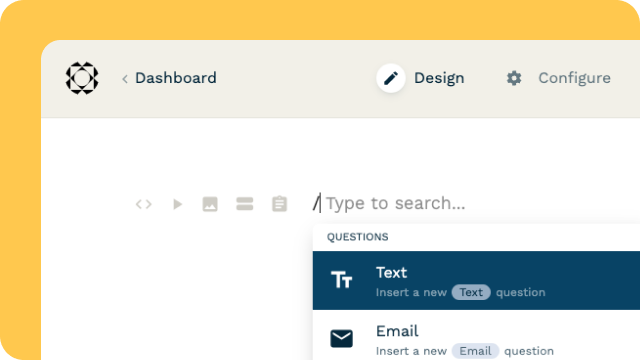
All Solutions

Explore all the solutions you can create with Paperform: surveys, quizzes, tests, payment forms, scheduling forms, and a whole lot more.
See all solutions











Connect with over 2,000 popular apps and software to improve productivity and automate workflows
See all integrationsSolutions
All Solutions

Explore all the solutions you can create with Paperform: surveys, quizzes, tests, payment forms, scheduling forms, and a whole lot more.
See all solutionsIntegrations

Connect with over 2,000 popular apps and software to improve productivity and automate workflows
See all integrationsResources
The 6 best WordPress form plugins in 2023

WordPress is kind of like a Rubik’s cube. It starts off easy enough but gets harder and harder the closer you get to your goal.
When you first get started with WordPress, you'll find creating pages and posts to be fast and easy. You can add a template in minutes and there are a ton of plug-ins. But if you want to make a change to the template you picked, you'll notice things starting to get a little tricky. They may have a good configuration system, or you might have to dig into the PHP.
Fortunately, adding a plug-in to your WordPress site is just as easy as anything. And most online form builder plugins are well-developed and should be relatively stress-free. The biggest challenge you'll face with form tools may come as a surprise. Picking the best one is extremely hard.
The biggest and best form plugins for WordPress are all almost carbon copies of each other. There is very little to distinguish one from the others. It's almost as if every time one of them releases a feature, all the rest say "That's a great idea!" Then they add the feature to their own offering.
Hopefully, by the end of this article, you’ll have a better grasp of the best direction to take when picking a WordPress plugin, even if only by a slim margin.
The best WordPress form builder plugins
1. Everest Forms
Everest Forms offers all the bells and whistles that most of the others do. Their pitch is “Best free drag and drop WordPress form builder plugin, trusted by 100000+ active users.”
Most apps will call themselves the best and most offer a drag-and-drop builder. So that doesn’t tell us much yet.
Everest currently has a five-star rating from over 300 reviews. That and their 100,000+ active users sounds great. But others on this list have over 1000 reviews and millions of active users.
That probably means that Everest is a newcomer. But even if they are, they’ve hit the ground running and have a solid offering.
Like most of the apps on this list, Everest Forms has an amazing set of features, but no clear niche to distinguish themselves. But they do have a few advanced features.
Essential Features
- Drag and Drop
- Custom Design
- Multi-Page Forms
- Spam Protection
- Payments - Everest lets you accept payments through PayPal and Stripe.
- Conditional Logic - Everest has a simple and direct conditional logic system with a clean interface.
- File Uploads - Everest lets visitors upload multiple files at once and gives a nice representation of their progress.
- Integrations - Everest has several integrations, including CRMs, webhooks, and Zapier.
Special features
- Repeater fields - This handy feature lets you reuse chunks of the form in multiple places. It’s especially helpful for complex forms.
- Calculations - Everest offers calculations to help with more technical forms and simple storefronts.
- Captcha for spam protection - If a lot of people are using your form, this can help improve the quality of your results.
Pricing
Pricing is feature-based and yearly and lifetime options are available. Annual plans range from about $50 to $199 per year. Lifetime rates start at $199 and go up to $699.
2. Formidable Forms
Overall, Formidable Forms has mostly the same set of features as the rest of the apps on this list. But Formidable Forms does stand out in at least one important way. They offer a no-code web app builder.
Formidable’s tagline is “the most advanced WordPress form builder.” And they do have a few unique features that help them live up to that claim.
Formidable Forms has a 4.5-star rating from over 900 reviews. And there are currently over 300,000 active installs.
Essential Features
- Drag and Drop
- Custom Design - Formidable Forms has some of the best styling options on this list.
- Multi-Page Forms
- Spam Protection
- Payments - Formidable Forms accepts payments through Stripe, PayPal, and Authorize.net. They also integrate with Woo Commerce.
- Conditional Logic
- File Uploads
- Integrations - Offers a solid selection of integrations, including ChatGPT-powered AI form responses.
Special features
- Geolocation
- User Registration
- App Builder
- Custom Directory - Give your site or app an employee directory, structured product list, and more.
Pricing
There are four pricing tiers and each one unlocks new features and more sites. They range from $39.50 to $299.50 per year.
3. Gravity Forms
Gravity Forms is business focused and seems to offer the same suite of features as everyone else. But if you dig a bit deeper, they actually have more to offer than the others. Their advanced features will appeal to businesses, programmers, developers, and designers.
They call themselves “the best WordPress form plugin.” Well, it looks like your search is over. Apparently, they’re the best… just like everyone else. Although, if you want a tool that lets you tinker with things behind the scenes, then Gravity Forms may just be the best for you.
Essential Features
- Drag and Drop
- Custom Design - Most tools on this list pride themselves in letting you design your form without CSS. Gravity goes the other direction and gives you CSS control over your design.
- Multi-Page Forms
- Spam Protection
- Payments - Gravity works with a handful of payment providers via add-ons. And because you can build your own add-ons, you should be able to get Gravity to work with any payment provider available.
- Conditional Logic
- File Uploads
- Integrations - Gravity Forms goes beyond integrations by providing add-ons and a well-documented API for advanced users to build them with.
Special features
- Create your own add-ons - There are so many add-ons in the WordPress plugin directory, that Gravity Forms itself is actually very hard to find.
- Email Logic - You can use response data to control where emails are sent after it's been submitted.
- Security - Gravity is GDPR compliant, provides spam blocking, and has a strong focus on security in general.
- CSS customization
- Merge Tags - If you have an especially complex form or one that represents something from a government bureaucracy, there may be multiple places where the same information is requested. Fields like name and address are commonly repeated on government forms. Gravity Forms removes the hassle of filling out the same field multiple times with merge tags.
Pricing
Gravity is so add-on oriented, that all of their features are considered add-ons as well. So each payment tier gives you a different selection of add-ons with premium add-ons at the highest tier. All of their licenses are paid annually and range from $59 to $259.
4. Ninja Forms
Ninja Forms offers a tool that’s easy to learn and use for anyone but is built with WordPress development freelancers and firms at the forefront of its attention. In addition to being focused on developers, Ninja Forms stands out in one other way.
It has the most convoluted pricing structure of almost any piece of software on the internet. At least they have a niche.
Ninja Forms sells itself as “The Drag and Drop WordPress Form Builder.” Maybe that made them stand out when they first launched. Now, they’d stand out if they didn’t offer a drag-and-drop builder.
If you were thinking that Gravity was unique in offering all of its features as add-ons, you were wrong. Ninja does that too. The difference is that the ability to build custom add-ons appears to be abandoned.
Ninja Forms is one of the most popular plugins with over 1,100 reviews and a 4.5-star rating. They also boast over 900,000 active installations.
Essential Features
- Drag and Drop
- Custom Design
- Multi-Page Forms
- Spam Protection
- Payments - Ninja has five payment options, including PayPal, Stripe, and Authorize.net.
- Conditional Logic
- File Uploads
- Integrations - Many of Ninja’s add-ons act as integrations. If you don’t find one you like, it also offers Zapier.
Pricing
Now we get to the absolute mayhem that is Ninja’s pricing structure. Ninja Forms has four annual plans ranging from $49 to $299 annually. Each tier lets you use more add-ons for more sites. So far, not so bad.
The problem happens when you want specific features. The features that Ninja provides at each tier are somewhat arbitrary. You may find yourself needing a feature from one of the top tiers without needing anything else from that tier.
Of course, that can happen with any tool on this list. But Ninja seems a bit more scattered. Fortunately, it has a solution.
Ninja Forms will let you purchase access to any of their add-ons for a one-time fee that applies to a certain number of sites that you build that add-on into. If you want to add that tool to more sites, you have to buy more licenses. That may not sound too bad. But remember that every feature in Ninja Forms is an add-on. That means that you have to pay for licenses for each and every feature that you want to use in each and every website that you build to use Ninja unless you buy one of the higher packs.
5. WP Forms
WP Forms is probably the most popular WordPress form add-on. They have been rated as five stars by almost 13,000 people. And they currently have over 5 million active installs, making them one of the most popular WordPress plugins overall.
Their tagline is “The world’s best drag and drop WordPress Form Builder.” That sounds familiar.
So what is it that makes WP Forms so popular? Is it easier to use, more feature-rich, or better priced? It doesn't seem like it.
WP Forms is pretty much the Kardashians of form makers. It's famous for being famous. Or maybe it's the bear they use for a mascot. Or maybe they actually are the best and everybody else has modeled their offering after WP Forms.
Essential Features
- Drag and Drop
- Custom Design - WP Forms almost definitely has a way to create custom form designs. But it’s not something they mention on itssite. They only mention custom layouts, which may or may not include design.
- Multi-Page Forms
- Spam Protection
- Payments - WP Forms lets you accept Stripe, Square, and PayPal. They also let you accept recurring payments, which is pretty uncommon.
- Conditional Logic
- File Uploads
- Integrations - WP Forms’ collection of integrations is one of the more impressive on this list. It’s not wildly extensive, but it’s better than the other non-add-on-based tools.
Special features
WP Forms does have some features that you won't find in any of the other tools. But none of them actually stand out as awe-inspiring game-changers.
If you're looking for something very specific and haven't found it already in this list, you may want to check out all the features listed on their pricing page. They might have something to scratch one of those hard-to-reach places.
Pricing
WP Forms pricing is also exactly what you've come to expect if you've read about the other tools on this list. There are four tiers with features gated behind each one.
The lowest tier costs 49.50 per year and they go up to 299.50 annually. And just like the other tools, each tier lets you add forms to more sites.
6. Paperform
Thinking outside of the box is generally considered a good idea. People who build sites on the WordPress platform tend to only look for WordPress-specific plugins.
There are lots of good WordPress form builder plugins out there, but they just can’t replace the experience of a solidly built application made to meet the demands of the whole internet. Fortunately, you don’t have to compromise.
Most real-world applications have WordPress plugins. And the few that don’t can almost always be embedded into any WordPress page by copying and pasting a single line of code. Paperform offers both options.
Paperform is a full-featured, real-world, incredibly versatile form tool. Not only does it play nicely with WordPress, it has a plugin with a five-star rating and can be embedded as a block or shortcode.
Paperform has every mainstream feature that every other tool on this list has, as well as an extremely streamlined interface. Paperform even has a collection of features to appeal to the tech-savvy, like custom HTML, CSS, and access to an API.
And unlike every other tool on this list, Paperform is a freestanding tool. If you ever decide to migrate away from WordPress or create another website that isn't WordPress based, you can take Paperform with you. Try it today for free.
Freelance Contributor
Deepak (Dee) Shukla, the dynamic founder of Pearl Lemon, built the leading SEO agency in London by l...
When Luiz Sifuentes lost the platform powering his entire web design business, he rebuilt smarter—wi...
Julie Winter, a broker licensed in 20 states with over 5,000 homes sold, uses Paperform to automate ...
All of our product updates and big company news for Paperform and Papersign from Oct 24 - May 25 to ...